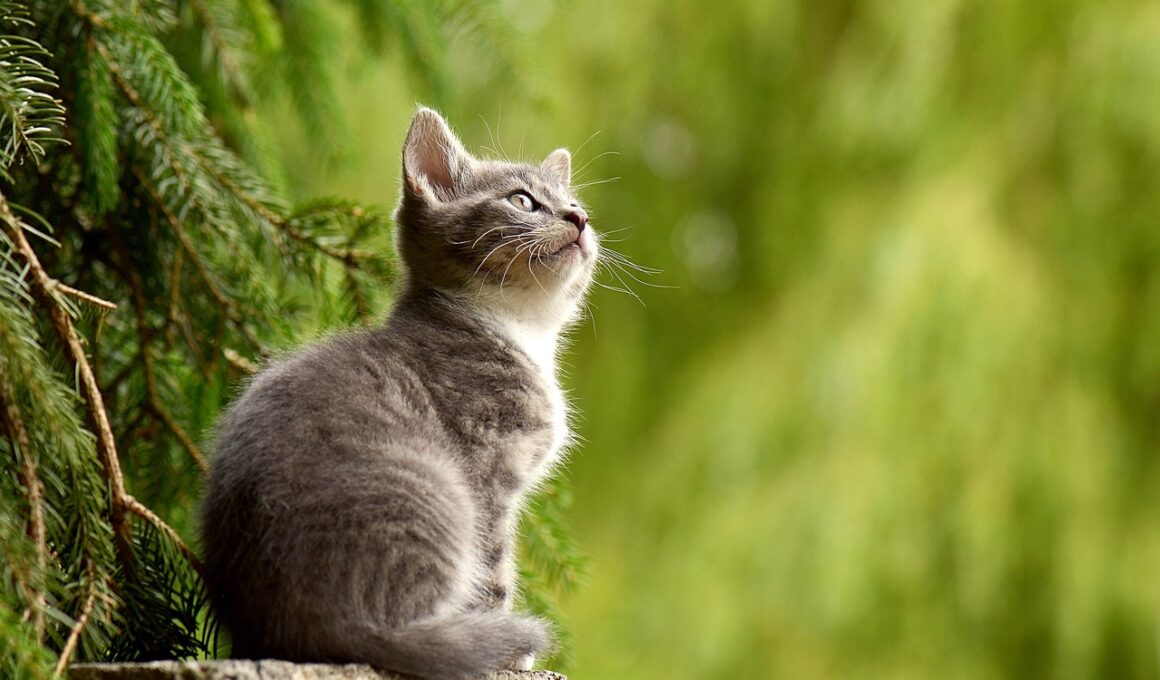How Kittens Develop Social Skills: A Comprehensive Guide
The early stages of a kitten’s life are crucial for developing their social skills. During this period, a variety of interactions with their mother and littermates significantly shape their behaviors and personalities. Socialization starts within the first weeks of life, significantly influencing how they respond to people and other animals. Kittens observe their mother and siblings, learning acceptable behaviors through play and imitation. This early learning stage involves exploring their environment with curiosity and cautiousness, which further enhances their development. Social skills are usually developed through play fighting, grooming, and even meowing. By observing their mother’s responses, they learn how to communicate effectively and develop emotional intelligence. Environmental influences, including living with humans and other pets, eventually help solidify this social learning. Understanding this process is essential for kitten owners who want to foster optimal social skills in their pets. Additionally, pet owners can engage their kittens in various interactive activities to enrich their social experience. Providing positive reinforcement will encourage social exploration and good behavior. Experts recommend structured playtime to facilitate these interactions, ensuring social competence in the long run.
Socialization naturally occurs mostly between two to nine weeks of age; however, effective social learning can continue until fourteen weeks. It’s important that this period does not lack positive human contact. Kittens depend on their mother’s nurturing during this critical time, as she provides the initial impetus for behaviors that will foster social skills. Owners should balance this contact with exposure to different situations, ensuring a comprehensive understanding of their social environment. Controlled introductions to new experiences, such as meeting other pets or people, can prevent later behavioral issues. Frequent interactions will help them feel comfortable and develop confidence in new environments. Additionally, owners can set a routine that includes social engagements, reducing anxiety and fear when meeting new faces in the future. Individuals with prior positive experiences often adapt better when encountering strangers or unfamiliar scenarios. Socialization prevents aggressive tendencies and promotes affectionate behaviors, making them better companions. In doing so, they also learn important boundaries when interacting with others. By fostering an inviting atmosphere and gradual exposure to diverse settings, pet owners can significantly influence their kitten’s social behavior, leading to a well-adjusted adult cat.
Play: The Essential Learning Tool
The role of play in kitten development is paramount. Through playful interactions, kittens learn important life skills, effective communication, and boundaries. Play mimics real-life scenarios, engaging a kitten’s instincts while teaching them about their social environment. During play, kittens practice their motor skills, coordination, and reflexes while also reinforcing their social bonds with their peers. Interaction during play consists of chasing, pouncing, and gentle biting, demonstrating the fundamental concept of boundaries. Play fights allow them to gauge their strength against one another, which is crucial for understanding their physical limits. Importantly, playtime prepares them for skills necessary for hunting and survival, helping them develop confidence in their abilities. Additionally, during these sessions, kittens derive joy from interacting with each other, leading to a heightened sense of empathy and attachment. Ensuring kittens have ample time for unsupervised play with their littermates encourages well-rounded socialization, as each kitten learns to interpret body language and cues from their companions. These playful exchanges ultimately create a foundation for lifelong social abilities, improving their adaptability as they encounter new experiences in their adult lives.
Human interaction is remarkably influential in shaping a kitten’s behavior. Engaging directly with kittens can counteract any timidness they might inherit from a lack of social encounter. Daily interaction with humans teaches kittens about affection, empathy, and appropriate behavioral responses. Encouraging gentle handling helps build trust and familiarity, strengthening their bond with caregivers. Positive reinforcement through treats and praise fosters desirable behavior while reducing anxiety associated with unfamiliar situations. The presence of different humans exposes kittens to varying voices, scents, and movements. These new experiences are fundamental in helping them adapt to diverse environments. Daily interactions should include varied kinds of touch to help kittens understand physical affection and play guidelines. Ideally, this should include allowing them to initiate contact for optimal learning. This environment enables them to comfortably explore social hierarchy, teaching them the subtleties of navigating social situations. Overall, integrating human presence into a kitten’s daily routine builds necessary skills for thriving within a household. Furthermore, these interactions can mitigate future behavioral problems, ensuring kittens grow into emotionally balanced cats capable of forming positive relationships with others.
The Importance of Early Exposure
Another crucial aspect of kitten socialization revolves around early exposure to various stimuli. New sounds, sights, and smells significantly impact a kitten’s ability to cope and adapt later in life. Kittens learn to approach or avoid novel stimuli based on positive or negative experiences during their formative weeks. Gradual exposure to new environments should happen safely and calmly, allowing kittens to explore without overwhelming them. These experiences can range from household noises such as vacuum cleaners to outdoor sounds like traffic. Sensory experiences boost their confidence, aiding in the development of a balanced personality. Furthermore, inviting visitors to meet kittens fosters socialization, reinforcing that new creatures can be friendly. Encouraging new experiences with other animals, particularly dogs, can also play a significant role in promoting confidence and adaptability. In tandem, these experiences expand their worldviews, forming the groundwork for their emotional resilience as adult cats. Offering supervised playdates with various animals can ensure that kittens develop healthy relationships with others. Understanding the role of early exposure is vital for preventing anxiety-related issues and enabling future adaptability.
The transition into new homes can be stressful for kittens, underscoring the importance of a gradual adaptation process. Adjusting to their environments requires careful management to ensure they feel at ease while exploring their new surroundings. During this period, establishing a routine helps provide structure and predictability, further bolstering their confidence. Allowing kittens to have their own space is vital, as they often require time to decompress and adapt. Familiar items, such as toys or bedding from their previous homes, can create a sense of security and familiarity. This process should be combined with gentle introductions to family members, allowing them to adjust without feeling overwhelmed. Monitoring their social behavior is crucial to determine if they are engaging positively or showing signs of stress. Providing comfort in the form of gentle interactions encourages social bonding. Owners should also consider offering engaging activities to keep their minds stimulated and reduce anxiety. This gradual process promotes healthy social skills in new settings, ensuring that the kitten becomes comfortable and well-adjusted in their new environment. As they begin to explore confidently, they develop essential social skills that will benefit them throughout their lives.
Conclusion: Building Lifelong Skills
The journey of kitten socialization is integral to their emotional and behavioral development. By understanding the various aspects influencing growth, pet owners can create an environment conducive to developing strong social behaviors. Engaging kittens through structured play, early exposure to diverse stimuli, and gentle interactions promotes confidence and acceptance in future experiences. Ensuring a mix of social contact with other animals and humans is pivotal in helping them navigate a variety of environments. Each learning opportunity strengthens their ability to communicate and bond, setting the stage for positive relationships later in life. Owners can aid in reducing anxiety by offering a safe space and various positive stimuli to create an enriching environment. Overall, the goal is to nurture well-rounded adult cats capable of flourishing in diverse social situations. The lessons learned during these formative months will have a lasting impact, shaping their interactions in their later lives. Owners are encouraged to monitor behavior and remain patient throughout this process. By actively participating in their pet’s growth, a lasting bond is established, ultimately leading to a harmonious and enjoable companionship.
Additional Resources for Kittens
For those wanting to delve deeper into kitten behavior and socialization, several resources are available. Books and online articles can offer essential insights into effective training methods, behavioral cues, and understanding kitten psychology. Furthermore, engaging with pet training professionals can provide tailored approaches that meet individual kitten needs. Online forums and communities also present opportunities for discussions about common challenges and solutions in socializing kittens. These platforms allow pet owners to share experiences, gather advice, and learn from one another. Videos and tutorials can visually demonstrate socialization techniques and playtime activities, making it easier for owners to implement strategies. Grooming sessions, vet visits, and exposure to diverse environments are perfect situations to apply socialization skills. Understanding the specific needs of different breeds can also help maintain context while socializing. A firm grasp of various factors affecting behavior can lead to creating an emotional and physically healthy environment for kittens to thrive. Ultimately, lifelong skills learned during kittenhood are fundamental for fostering well-adapted adult cats capable of forming healthy bonds.


